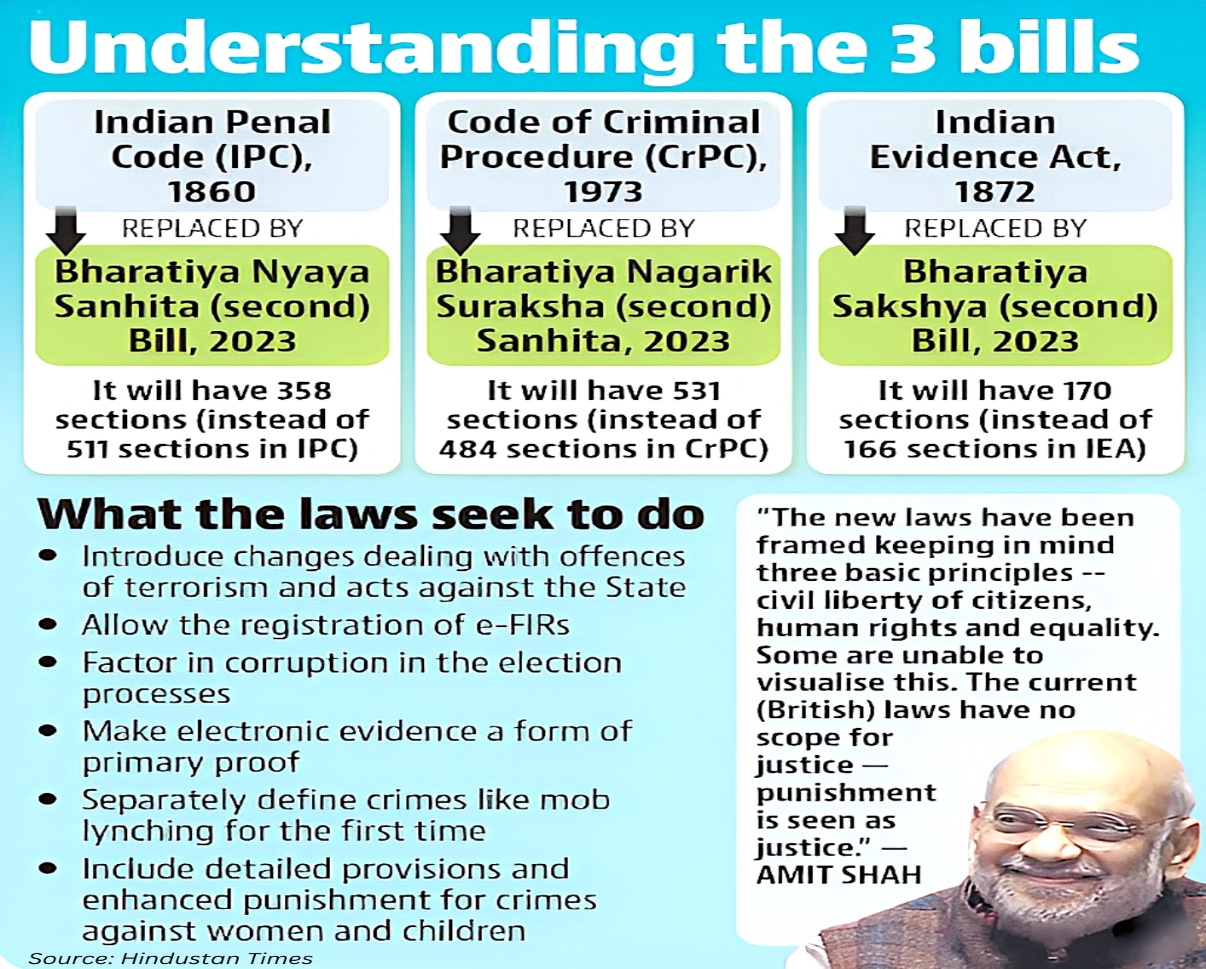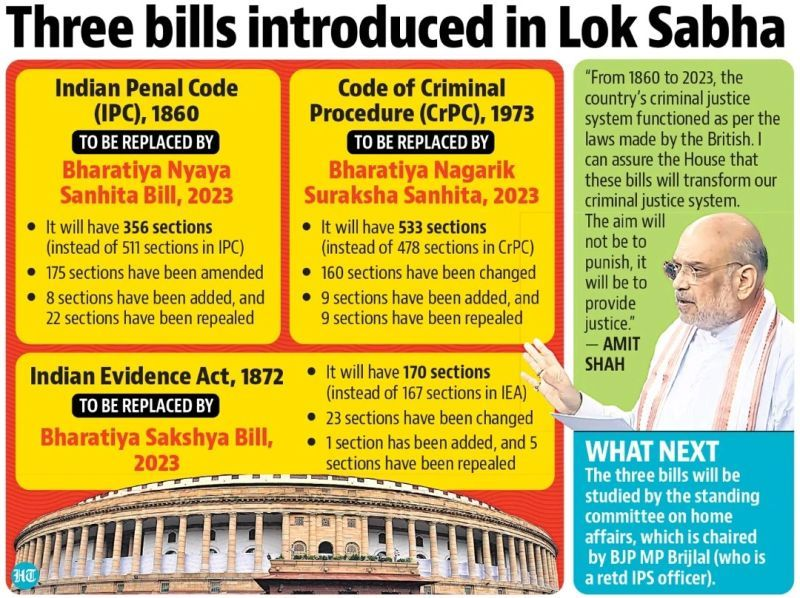Special: Biggest Reform in Criminal Laws- A Game Changer

Disclaimer: Copyright infringement not intended.
Context
- India's criminal justice system has been predominantly shaped by laws and regulations inherited from the British colonial era.
Details:
- In the post-independence years, these legal foundations underwent alterations and amendments to align with the evolving requirements of modern times.
- The experience of seven decades of Indian democracy calls for a comprehensive review of our criminal laws, including the Code of Criminal Procedure, and adopt them by the contemporary needs and aspirations of the people.
- The pre-independence criminal laws were used by the British to protect their colonial interests, to rule the people and the country, and to maintain their authority and supremacy over India.
- There was a need for a comprehensive review of the criminal laws, especially the Indian Penal Code, Criminal Procedure Code, and Indian Evidence Act, and to adapt them according to present-day needs and aspirations.
- In 2019, the Prime Minister of India advocated for the need to revamp all the legislation enacted across all departments during the British era.

INTRODUCTION:
- British laws were aimed at strengthening British power by punishing people rather than giving them justice.
- The country’s criminal justice system, which has adhered to British-made laws from 1860 to 2023, is poised for substantial change as the three laws are slated for replacement.
- The experience of seven decades of Indian democracy calls for a comprehensive review of our criminal laws, including the Code of Criminal Procedure, and adopting them to the contemporary needs and aspirations of the people.
- In a path-breaking development, Union Home Minister Amit Shah presented a trio of bills in the Lok Sabha signaling intent to replace the Indian Penal Code, the Criminal Procedure Code, and the Indian Evidence Act to be shifted from punishment to the provision of justice. The IPC of 1860 is set to be replaced by the Bharatiya Nyaya Sanhita, in 2023.
- The CrPC of 1973 will be replaced by the Bharatiya Nagarik Suraksha Sanhita, 2023 whereas the Indian Evidence Act of 1872 will be replaced by the Bharatiya Sakshya Bill, 2023.
Transformation of India's Criminal Justice System through Legislative Changes:
- The recent legislative changes have been implemented with the primary goal of ensuring speedy justice and adapting the legal system to the contemporary needs and aspirations of the people. The overarching aim is not just punishment but the provision of justice, with punishment serving as a deterrent to curb criminal activities.

Salient Features of the Bills:
Sedition
- The Indian Penal Code (IPC) defines sedition as bringing or attempting to bring hatred contempt, or exciting disaffection towards the government.
- The Bill removes sedition as an offense and replaces it with penalties for activities such as exciting or attempting to excite secession, armed rebellion, subversive activities, encouraging separatist feelings, or endangering the sovereignty or unity of India.
- Offences under the new provisions may result in imprisonment of up to seven years or life imprisonment, along with a fine.
Terrorism
- The Bill defines terrorismas acts intending to threaten the unity, integrity, and security of the country, intimidate the public, or disturb public order.
- Includes the use of firearms, bombs, hazardous substances, destroying property, disrupting essential services, and activities listed in the Unlawful Activities (Prevention) Act, 1967.
- Death or life imprisonment for acts resulting in death, imprisonment term between five years and life in other cases. Offenders may also face a fine of at least five lakh rupees.
- Conspiring, organizing, or assisting in preparing any terrorist act carries imprisonment between five years and life, along with a fine.
Organized Crime
- Continuing unlawful activities such as kidnapping, extortion, contract killing, land grabbing, financial scams, and cybercrime, carried out by violence or intimidation for material or financial benefit, by individuals or crime syndicates.
- Death or life imprisonment for offenses resulting in death, imprisonment term between five years and life in other cases, along with a fine.
Petty Organized Crime
- Organized crimes cause general feelings of insecurity, committed by criminal groups/gangs, including pickpocketing, snatching, and theft.
- Attempting or committing petty organized crime is punishable with imprisonment between one and seven years and a fine.
Murder on Grounds of Caste or Race
- Murder committed by five or more people on specified grounds (race, caste, sex, place of birth, language, or personal belief) is punishable with imprisonment between seven years and life, or death, along with a fine.
Death Penalty for Gang Rape of Minors
- The bill extends the provision of the death penalty for gang rape to include victims under 18 years of age, broadening the scope beyond the previous provision which applied to victims below 12 years of age under the Indian Penal Code.
Sexual Intercourse by Deceitful Means
- This provision criminalizes sexual intercourse with a woman through deceit or a false promise of marriage without intending to fulfill it.The punishment could range from simple to rigorous imprisonment for up to 10 years, coupled with a fine.
Extending Offenses to Boys
- The Bill specifies that importing boys under the age of 18 years for illicit intercourse with another person will be an offense. This provision aligns the law with a gender-neutral approach concerning certain offenses related to illicit activities involving minors.

Impact:
- The replacement of existing laws with the newly introduced trio is expected to bring about a significant transformation in India's criminal justice system. The focus is on protecting the rights of Indian citizens, with punishment serving as a means to deter criminal activities. The bills aim to create a strong and effective legal framework that prioritizes justice and addresses the evolving needs of society.
The Bhartiya Sakshya Bill 2023:
- The proposal aimed at modernizing the rules governing the admissibility of evidence in legal proceedings in India. By repealing the Indian Evidence Act, of 1872, it indicates an intent to update and adapt these rules to contemporary contexts.
Admissibility of electronic or digital records as evidence
- The bill aims to update the definition of documentary evidence to include electronic or digital records. It expands the scope to encompass information stored in various devices like smartphones, laptops, server logs, and even voice mails. This change essentially equates the legal effect of electronic records to that of paper records.
Oral evidence
- The proposed bill extends the definition of oral evidenceto include information given electronically, acknowledging that statements made electronically can be considered as oral evidence.
Secondary evidence
- The bill expands the definition of secondary evidence. While primary evidence includes original documents and their electronic counterparts, secondary evidence now includes oral and written admissions, as well as the testimony of an expert in examining documents.
- It clarifies that secondary evidence might be necessary not only when the original document is inaccessible but also when the genuineness of the document is in question.
Production of documents
- The bill specifies that while witnesses summoned to produce documents must do so, the court will not demand privileged communications between Ministers and the President be produced before it. This safeguards certain types of communications from mandatory production in court.
Joint trials
- In the context of joint trials involving multiple accused individuals, the bill elaborates on the treatment of confessions made by one accused that implicate others.It also clarifies that trials involving multiple individuals will still be considered joint trials even if one accused is absent or has not responded to an arrest warrant.

The Bharatiya Nagarik Suraksha Sanhita 2023:
Key changes proposed under the bill include:
- The new legislation aims to replace the Code of Criminal Procedure, 1973. The Bill preserves most of the provisions of the Code of Criminal Procedure, 1973, but also introduces some changes and reforms.
- The Code of Criminal Procedure, 1973 is the existing law that governs the process of arrest, trial, and bail for criminal offenses under various laws such as the Indian Penal Code, 1860.
Detention of Undertrials
- Under the current Code, if an accused spends half of the maximum imprisonment period during investigation or trial, release on personal bond is mandated. The new bill modifies this, excluding release for offenses punishable by life imprisonment or when facing multiple proceedings.
- First-time offenders may secure bail after completing one-third of the maximum imprisonment for the offense, necessitating an application by the jail superintendent.
Electronic Trials
- The Bill proposes that legal proceedings, including trials and inquiries, can be conducted in electronic mode.This means that court proceedings could take place through digital platforms or electronic communication systems.
- It allows for the production of electronic communication devices, such as mobile phones and computers, as potential sources of digital evidence during investigations or trials.
Medical Examination of Accused
- The existing legal framework allows the medical examination of accused individuals in specific cases, like rape, but limits the request for such examinations to at least a sub-inspector level police officer.
- The Bill suggests expanding this authority to any police officer, providing more flexibility in initiating medical examinations.
Forensic Investigation
- The Bill mandates forensic investigation for offenses carrying a minimum punishment of seven years of imprisonment.
- It ensures that forensic experts visit crime scenes to collect evidence, and the entire process is documented using electronic devices. If a state lacks forensic facilities, it can utilize facilities in another state.
Prohibition of Carrying Arms
- The existing legal provision empowers District Magistrates to prohibit the carrying of arms in certain public situations for up to six months. The Bill proposes to omit this provision, possibly for reasons related to its non-notification or perceived redundancy.
Signatures, Finger Impressions, and Voice Samples
- The Bill expands the powers of Metropolitan/Judicial Magistrates to order the provision of not just specimen signatures and handwriting but also finger impressions and voice samples.
- Importantly, this can be done even for individuals who have not been arrested, broadening the scope of the magistrate's authority.
Timelines for Procedures
- The Bill introduces specific timelines for various legal procedures, such as the submission of medical reports within seven days for cases involving rape victims.
- It sets timeframes for giving judgments, informing victims of investigation progress, and framing charges in session courts.
Trial in Absence of Offender
- The Bill allows for the conduct of trials and pronouncement of judgments in the absence of a proclaimed offender. This is applicable when the accused person has evaded trial, and there's no immediate prospect of their arrest.
Metropolitan Magistrates
- The Bill omits the provision related to the notification of metropolitan areas and the appointment of Metropolitan Magistrates in cities or towns with a population exceeding one million. The reasons for this omission are not explicitly mentioned.
Conclusion
- The success of these bills in achieving their intended outcomes will depend on effective implementation, ongoing evaluation, and responsiveness to emerging challenges. Public awareness and engagement will also play a crucial role in ensuring the success of these reforms.
CITATIONS:
https://sansadtv.nic.in/episode/sansad-tv-special-biggest-reform-in-criminal-laws-a-game-changer-24-december-2023
https://internetfreedom.in/three-new-criminal-law-bills/#:~:text=or%20deforming%3F)-,the%20criminal%20justice%20system%3A%20A%20digital%20rights%20overview%20of%20the,Nagarik%20Suraksha%20(Second)%20Sanhita.
https://prsindia.org/billtrack/overview-of-criminal-law-reforms
https://www.thehindubusinessline.com/news/national/ls-passes-criminal-reform-bills-shah-says-most-modern-laws-globally-aimed-at-offering-justice-not-punishment/article67658981.ece
https://www.thehindu.com/opinion/op-ed/new-bills-and-a-principled-course-for-criminal-law-reforms/article67202560.ece
https://www.legalserviceindia.com/legal/article-9731-criminal-law-reforms-in-recent-times.html





